Trending Issues: The Quest for the Magic Economic Trifecta to Steer the New Digital Global Economy
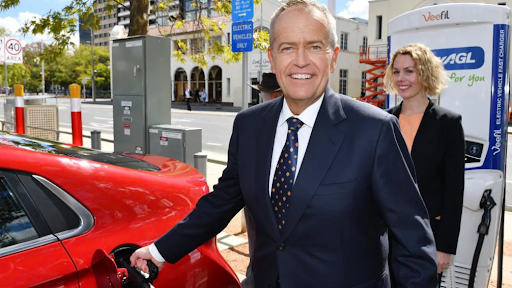

Should Bill Shorten make it to the Cabinet Room again after 18 May, the incoming government will receive corporate support Labor’s support for investment strategies in both public and private sectors in a weakening Australian and global economy. Strong historical precedents for the final gravitation of the Australian electorate to inspirational Labor leaders like John Curtin in 1943, Bob Hawke in 1983 and from Paul Keating a decade later in that Sweetest Victory of All against a 15 per cent rate for the GST.
Within the Shorten Ministry, there will be a high level of financial talent including Chris Bowen as Treasurer, Jim Chalmers as Minister for Finance, Andrew Leigh as Assistant Treasurer and Minister for Trade as well as Ed Husic in Digital Economy. Ed Husic represents the safe Labor seat of Chifley in the crucial Western Sydney Heartland which recorded an 8 per cent swing to Labor in the 2016 federal election.
Retaining the marginal Labor seats of Lindsay and Reid and winning Banks, Gilmore and Robertson from the federal LNP are vital end-games in Election 2019 as shown by the plateauing out in the trend-lines of the latest tight Newspoll (The Australian Online 13 May 2019):
The Newspoll survey is based on a sample of 1,644 voters between 9-11 May 2019 with a 2.4 per cent margin of error.
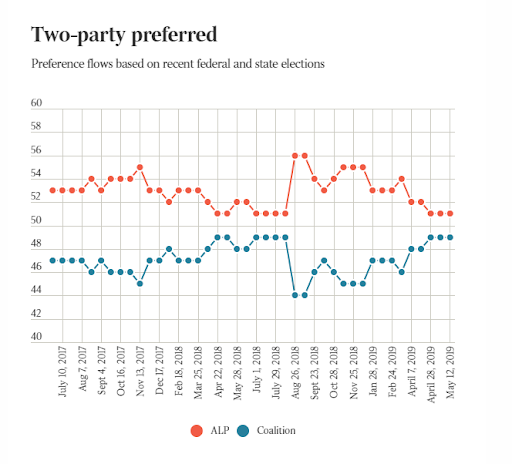
Translating these results to marginal seats like the marginal Labor seats of Bass and Herbert or the federal LNP seats of Leichhardt and Corangamite is beyond the capacity of electoral intelligence from the current Newspoll.
Campaigning this week in a dozen or more marginal seats will fine-tune the electoral outcomes in a series of local referenda on economic confidence in the two mainstream parties as preferences are allocated by voters from the minor parties and the re-emergent United Australia Party (UAP) being promoted by Clive Palmer. There will be real surprises in a number of marginal seats which have not had a high profile in reporting on the national campaign.
Barrie Cassidy’s interview on the Insiders (12 May 2019) provided Bill Shorten with an opportunity to offer re-assurances about Labor’s Economic Trifecta with its commitment to reverse unpopular cuts to service delivery by the federal LNP, initiating fairer tax breaks and promising larger surpluses. A video of the Insiders Programme is available.
It is the detailed interview with Bill Shorten which provides the best insights into Labor’s economic agenda for the final days of the national campaign.
Labor’s Pragmatic Economic Agenda
Australia’s two trillion-dollar national economy as measured in Purchasing Power Parity (PPP) is almost half the size of either France or the UK. Here lack-lustre investment trends have been associated with weak economic growth rates during BREXIT negotiations. The weak capacity of trending investment extends to the Australian private sector.
Australia’s trending investment sector is not assisted by the Trump Administration’s Trade and Investment Disputes with China. As at the G20 Forum in Buenos Aires, China was prepared to make concessions of additional purchases from the USA.
Hopefully, the recent reverses on global markets are merely examples of temporary volatility which have already recovered from a bad correction in Mid-November just prior to the meeting between President Trump and President Xi at the G20 Forum. Yahoo shows the Dow Jones trendlines since 7 May 2018:
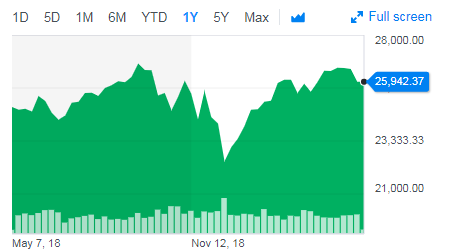
Back to Business as Usual for Australia?
Our advantage is Australia’s proximity to economic powerhouses like Indonesia. Indonesia will have the third most populous Asian nation by 2050. Indonesia is the world’s seventh largest economy if measured in PPP terms compared with Australia’s 19th position. It strongly embraces China’s Belt and Road (BRI) Investment Initiatives which are acclaimed across the Asian continent and beyond.
Indonesia is now a major global investment hub as shown by the data from CEIC Online:
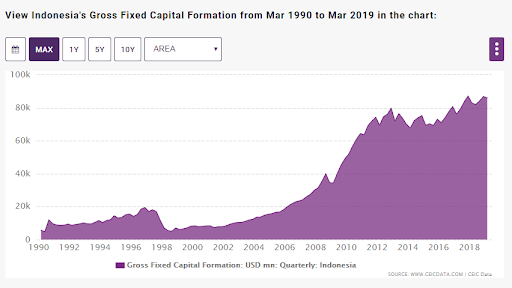
Comparative data for Australia from the same source as measured in US dollars is far less healthy than the rosy picture offered by the federal LNP.
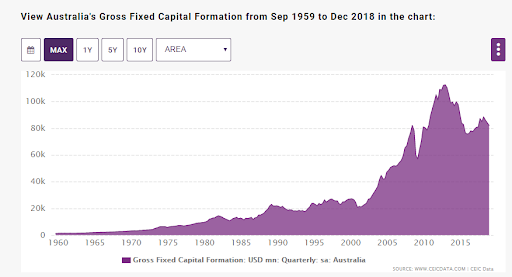
Government spending and temporary federal deficits during the GFC era in Australia during the Rudd-Gillard years (2007-13) saved Australia from its gravest economic challenge since the 1930s. The federal LNP was handed an economy with healthy rates of capital expenditure in both the public and private sectors. This was replaced by an ideological perspective on economic management with unimpressive results during the past year to January 2019:
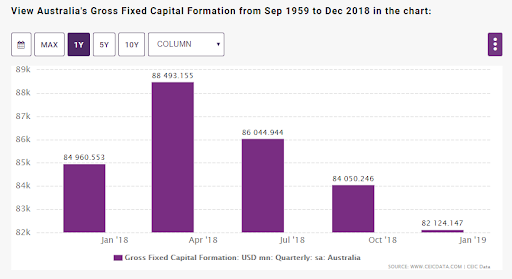
Emergent Impact of the Trump Factor in Australia’s Financial Relations
While elites in the federal LNP will never criticize president Trump’s America First Strategies, the Post-Obama era is full of new economic hazards for Australia as a middle-sized economy with a pivotal consensus-building financial role in the Indo-Pacific Basin.
IMF Data from the World Economic Outlook (April 2019) shows the extent of the difficulties imposed by the Trump Administration’s America First Strategies on investment flows to rival developed economies from Australia and New Zealand to the most successful European economies like Germany and Denmark:
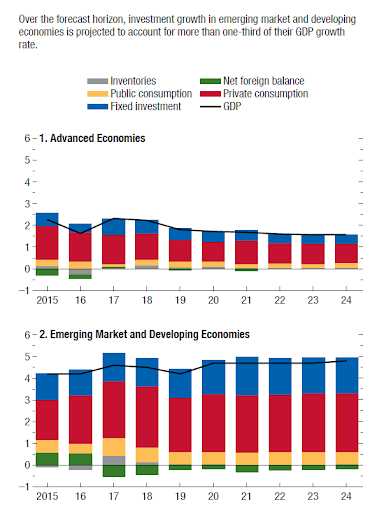
As global capital flows tighten, it is the low-cost emerging economies and the US itself which benefit most from the Trump Administration’s return to corporate-led development models.
To Australia’s north, countries from PNG to Indonesia and beyond are largely ignoring the Trump Administration’s directives about trade and investment ties with China which is the hub of a commercial outreach to most countries regardless of their ideological orientation. This includes Japan, South Korea, Taiwan and Russia plus the Silk Road countries as far as the Middle East and Continental Europe.
The Strait Times Online (6 December 2018) offers its own assessment of the advantages of BRI projects for Indonesia:
Jakarta offers new projects worth up to $82b in bid to capitalise on Belt and Road Initiative
JAKARTA • Indonesia is offering new projects worth up to US$60 billion (S$82 billion) to Chinese investors in a bid to capitalise on Beijing’s Belt and Road Initiative (BRI), a senior official has said, despite growing concern over the strings attached to some of the loans.
Despite Indonesia’s strategic location, South-east Asia’s largest economy has not been among the biggest beneficiaries of China’s trillion-dollar push to create a modern-day Silk Road.
Its best-known BRI project is a US$6 billion railway linking the capital city of Jakarta to the textile hub of Bandung, which has faced land procurement problems.
However, Jakarta has been in “structural communication” with Beijing since last year on possible infrastructure projects worth a combined US$50 billion to US$60 billion, said Mr Ridwan Djamaluddin, the deputy for infrastructure at Indonesia’s Coordinating Ministry for Maritime Affairs.
Indonesia has proposed potential projects across the archipelago, while Chinese officials and experts have toured regional governments in search of projects to fund, he told Reuters in an interview.
The PNG Prime Minister has just issued a glowing report of his country’s participation in the recent BRI Forum in Beijing (Xinhua Online 30 April 2019):
SYDNEY, April 30 (Xinhua) — Papua New Guinea’s Prime Minister Peter O’Neill has praised China’s Belt and Road Initiative (BRI), having returned home from the project’s second international forum in Beijing across the weekend.
O’Neill described the BRI as being impressively broad in scale and potentially a huge benefit for all those involved, according to PNG media outlet The National.
“This is a big market and through better transport systems and supply chains, it offers great opportunities for our food producers and other small and medium enterprises,” the prime minister was quoted as saying.
“The Belt and Road Initiative is aimed at delivering sustainable economic growth and lifting living standards, reducing poverty, enhancing job creation and creating business opportunities,” he said.
O’Neill explained that the initiative relies not just on hard infrastructures such as roads, bridges and airports but also soft infrastructure, like “logistics, technical capacity building, skills sharing, access to finance markets at concessional rates and cultural exchange through education and tourism.”
He described these as creating advantages for PNG in the coming digital economy which holds exciting advancements in the realms of artificial intelligence, technologies, automation and financial technology.
Who is Best Equipped to Manage the Australian Economy of the Future?
Although preferences from minor right-wing parties including Clive Palmer’s UAP may still be the spanners in the works against a change of government on 18 May, financial markets usually find a way of outsmarting negative political interference and are probably welcoming the arrival of Bill Shorten at the Lodge because Labor is open to fresh approaches for management of the economy of the future.
Fortunately, the Reserve Bank (RBA) acted wisely to keep interest rates on-hold on 7 May when the current state of the Trade and Investment Dispute between the US and China was still in a dangerous phase. MarketWatch Online (10 May 2019) shows the stabilising effects of the RBA decisions on the value of the Aussie Dollar relative to the Greenback over the past year:

MarketWatch gave an early warning of this situation on 30 January 2019.
In contrast to the national campaign against Labor’s economic policies, it is the ideological rejection of more Chinese investment flows which should be receiving prime attention as a threat to the national economy.
Australian financial markets must surely want Australian leaders to break out of the Colonial Cringe as recommended a generation ago by Paul Keating to embrace the most dynamic and least restrictive economies in the Indo-Pacific Basin.
Old school political thought, of course, embraces the Trump Administration’s America First Approach as earlier generations of Australian conservatives tuned into intelligence advice from Britain during the 1930s.
Australia’s economy and regional security are in safe hands under Bill Shorten’s Labor team with a decisive working majority in the House of Representatives to control the impact of an interfering senate that is ruled from the crossbench by flamboyant populist leaders as in 2010.
 Denis Bright is a member of the Media, Entertainment and Arts Alliance (MEAA). Denis has qualifications in journalism, public policy and international relations. He is committed to citizens’ journalism by promoting discussion of topical issues from a critical structuralist perspective. Readers are encouraged to continue the discussions in this current series of Trending Issues for Australians in this election year.
Denis Bright is a member of the Media, Entertainment and Arts Alliance (MEAA). Denis has qualifications in journalism, public policy and international relations. He is committed to citizens’ journalism by promoting discussion of topical issues from a critical structuralist perspective. Readers are encouraged to continue the discussions in this current series of Trending Issues for Australians in this election year.
Like what we do at The AIMN?
You’ll like it even more knowing that your donation will help us to keep up the good fight.
Chuck in a few bucks and see just how far it goes!










25 comments
Login here Register here-
Mia -
Leila -
Stella -
Paul -
Chris -
Pat -
rubio@coast -
Kaye Lee -
James Robo -
Tessa_M -
rubio@coast -
Kaye Lee -
Kaye Lee -
corvus boreus -
rubio@coast -
rubio@coast -
rubio@coast -
Kaye Lee -
corvus boreus -
Peter F -
rubio@coast -
Kaye Lee -
Kronomex -
Kaye Lee -
Kronomex
Return to home pageWelcome comments of hope in contrast to those nasty cards about Labor’s wrecking potential. No mention is ever made of the GFC in the Liberal Party handouts. It was Labor that saved Australia as a middle-sized economy during the head-winds of the GFC. Investment levels were consolidated in both government and business sectors as Denis mentions in his article until the economy was passed onto Tony Abbott and Joe Hockey in 2013.
Great article Denis, role on Saturday , & a Labour victory should prevail
Labour is the only party with a forward thinking direction, trying to bring everyone in the nation with them
Denis, Thanks for an interesting article on the Australian economy and it’s position in the Asian economy.
Our electorate of Wide Bay could do with more commitment to technical education programmes for the new digital economy to support tourism and environmental management.
TAFE education has so much to offer and it is being well funded in Labor’s campaign for the future.
Labor’s seems committed to the new economy – let’s hope is continues post election!
Our seat of Robertson seems headed for change. Bill Shorten received a rock-star welcome yesterday which was covered by the Sydney media
rubio@coast,
Yes. And he said they would review seismic testing which I was very pleased to hear. Lucy Wicks has been a head-nodding waste of space.
Sections of Page Electorate based on Lismore have real economic problems and will benefit from Labor’s commitment to TAFE.
Why keep practical students at high school after Year 10 when they could handle regionally based technical education courses in their local regional centres. Just what the Liberal Party offers to the youth in regional areas is difficult to assess. Catchment management should be a priority across the regions so that eco-tourism benefits.
Thanks Kaye.
People should be more aware of the problems posed by too many head-nodders in most political parties.Problem is surely that popular culture and the music scene in particular are all into narcissism and corporate obedience strategies.
People need to be more involved in politics.
Do you have some preferred music that might be suitable for election victory parties or political wakes in Clive Palmer’s team can prevent the change of government?
Let’s have some feedback on appropriate progressive election music for our times which can assist in mobilisation against a far-right Australian nation in the future.
Music suggestions….
Judy Small, You don’t speak for me
Leo Sayer, No fracking way
I’d like to buy the Koch’s a world
We are the world
https://www.youtube.com/watch?v=M9BNoNFKCBI
Lily Allen, F*ck you
We are people, hear us roar
In numbers too big to ignore
And we know too much to go back an’ pretend
‘Cause we’ve heard it all before
And we’ve been down there on the floor
No one’s ever gonna keep us down again
Oh yes, we are wise
But it’s wisdom born of pain
Yes, we’ve paid the price
But look how much we gained
If we have to, we can do anything
We are strong
We are invincible
We are people
You can bend but never break us
‘Cause it only serves to make us
More determined to achieve our final goals
And we come back even stronger
Not a novice any longer
‘Cause you’ve deepened the conviction in our souls
Oh yes, we are wise
But it’s wisdom born of pain
Yes, we’ve paid the price
But look how much we gained
If we have to, we can do anything
We are strong
We are invincible
We are people
We are people watch us grow
See us standing toe to toe
As we spread our lovin’ arms across the land
But we’re still an embryo
With a long, long way to go
Until we make each other understand
Oh yes, we are wise
But it’s wisdom born of pain
Yes, we’ve paid the price
But look how much we gained
If we have to, we can face anything
We are strong
We are invincible
We are people
My personal music suggestion, not for any value in terms of current political relevance, but simply because I reckon it is a relatable slice of enjoyable raw talent (Colter Wall, Sleeping on the Black Top); https://www.youtube.com/watch?v=qSYkikkitS0
Most appreciated Kaye and Corvus. I particularly liked the Koch Commercial. The theme of working class interacting with Corporate Arse is highly appropriate to the rise of Clive Palmer in Herbert and Senate Spots in WA and Q. Lots of voters must be influenced by pages of coloured advertisements in support of Corporate Arse.
These lyrics take political participation in a new direction away from the rhetorical nonsense of conventional election advertisements which foster more toilet stops and more beers later.
Keep the music coming with other suggestions to shake up apathetic voters in the last hours of Campaign 2019.
Progressive music can be the Trending Issue as suggested in Denis article which is indirectly about working class and corporate arse.
Is it too late to save Herbert from a projected 12 per cent Palmer Vote with all its implications? How could Herbert vote that way after all the tragedies and disasters to hit Townsville?
Introduced to me on a surfing trip to So Cali. Alas, minor parties in other states helped Trump to win the Presidency by taking votes from the Democratic Party. At its best, the USA can be very progressive but corporate arse seems to always Trump across the line. UAP is trying that here.
Nice nostalgic music from CPUSA but where is the progressive music of our times? Keep the suggestions rolling corvus and kaye. We want music that inspires in 2019 and beyond in case the expected change evaporates before 18 May.
Joni Mitchell, Big Yellow Taxi
Flobots; We are winning https://www.youtube.com/watch?v=exmp6NQ0et8
Appallachia Rising; Scale down https://www.youtube.com/watch?v=Bmr5rdaemYk
@kaye: Judy Small +++++++
Rap is also a potential Australian political communication genre:
Users of the AIM Site can keep everyone informed on developments in Progressive Rap.It seems that regional radio networks talk up square politics when people in the streets of regional cities still like radical and less unorthodox musical genres. Lots of regional people are radical in spirit and lifestyle but very square in political involvement. Its too late now to change things but Progressive Music is so important to encourage people to make a break from SFF, One Nation and Now UAP.
Thanks the tips. I have tried them all but I particularly like the Koch Commercial: https://www.youtube.com/watch?v=MbykzqJ6ens Working Class versus Corporate Ass
What is the rap equivalent in Aus and the USA and UK? And the heavy metal version too. Regional people will tune into to innovative political genres is song away from old style folk which people aware people love but others find dated.
I am yet to find a rap song with any sort of decent lyrics. They all seem to be about hating cops.
Kaye Lee,
How about https://www.youtube.com/watch?v=_BRv9wGf5pk or https://www.youtube.com/watch?v=KkhGkRahU6g&list=RD_BRv9wGf5pk&index=3
A couple of oldies but goodies.
🙂
Kronomex,
They might be catchy but the lyrics are crap IMO.
John Lennon, Imagine
Kaye Lee,
Gads, you have just given me an idea for two songs that could be themes for Scummo (with apologies to The Beatles) –
and